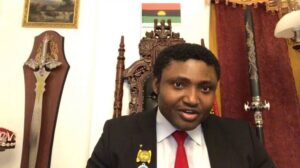The Finnish government has recently announced that it is taking significant steps regarding the activities of Simon Ekpa, a prominent pro-Biafran agitator who has gained notoriety for his involvement with the Indigenous People of Biafra (IPOB). Ekpa, who resides in Finland, has been actively promoting secessionist activities in the South-East region of Nigeria, much to the concern of both the Nigerian and Finnish governments.
This development was disclosed by Finland’s Minister for Foreign Affairs, Elina Valtonen, during a press conference held in Abuja, Nigeria’s capital. Valtonen addressed the media alongside her Nordic counterparts, highlighting that the Finnish government is now addressing the issue through legal channels. According to Valtonen, the case involving Ekpa, which was brought to the attention of the Finnish authorities by the Nigerian government, is currently being handled by Finnish courts.
Simon Ekpa, who has declared himself the “Prime Minister” of Biafra, has been a fervent advocate for the implementation of sit-at-home directives across the South-Eastern states of Nigeria. These directives have often led to widespread disruption in the region, despite the fact that the mainstream leadership of IPOB had suspended the exercise. Ekpa’s actions have continued to stir unrest, with his calls for sit-at-home protests aimed at pushing for the release of IPOB’s detained leader, Nnamdi Kanu.
 The situation escalated in February 2023, shortly before Nigeria’s presidential and national assembly elections, when Ekpa issued threats that the elections would not be allowed to take place in the South-East. His actions prompted swift intervention by Finnish authorities, leading to his arrest in Lahti, Finland, where he resides. According to reports from the Finnish newspaper Helsingin Sanomat, Ekpa was apprehended at his residence by local police following his inflammatory remarks and threats against the Nigerian elections.
The situation escalated in February 2023, shortly before Nigeria’s presidential and national assembly elections, when Ekpa issued threats that the elections would not be allowed to take place in the South-East. His actions prompted swift intervention by Finnish authorities, leading to his arrest in Lahti, Finland, where he resides. According to reports from the Finnish newspaper Helsingin Sanomat, Ekpa was apprehended at his residence by local police following his inflammatory remarks and threats against the Nigerian elections.
Despite his arrest, Ekpa was eventually released and has since continued to maintain a strong presence on social media, where he disseminates his pro-Biafran messages and calls for secession. His activities have been a source of tension not only in Nigeria but also within the Finnish government, which has found itself in a delicate position due to Ekpa’s actions originating from its territory.
During the press conference, Minister Valtonen emphasized that the Finnish government is committed to addressing the issue in accordance with its legal system. The case is now under the jurisdiction of Finnish courts, and it remains to be seen what the outcome will be. Valtonen’s remarks came as part of a broader visit to Nigeria
By a delegation of Nordic ministers, including representatives from Sweden, Iceland, Norway, and Denmark. The delegation’s visit is primarily aimed at deepening trade ties between the Nordic countries and Nigeria, but it also underscores the importance of addressing issues related to violent extremism and secessionist movements that have far-reaching implications.
The Nordic ministers’ visit to Nigeria is part of a larger tour of West Africa, during which they are focusing on various critical issues, including countering violent extremism and advancing sustainable development goals in the region. Their visit highlights the growing concern among European nations about the rise of violent extremism and the need for international cooperation to address these challenges.
In her remarks, Valtonen underscored the significance of the relationship between Finland and Nigeria, particularly in the context of global security and economic cooperation. She noted that Finland, along with its Nordic partners, is committed to working closely with Nigeria and other African nations to promote peace, stability, and sustainable development across the continent.
The Finnish government’s response to the activities of Simon Ekpa reflects a broader international concern about the influence of diaspora figures on local conflicts and secessionist movements. As the legal proceedings in Finland continue, it is clear that the case has implications not only for Nigeria but also for the broader relationship between Europe and Africa in addressing issues of political instability and extremism.
As the Nordic ministers continue their diplomatic tour, which includes a two-day visit to Ghana, their focus remains on crystallizing relations with African nations and addressing the complex challenges that impact both regions. This ongoing dialogue underscores the importance of international collaboration in tackling global issues, from violent extremism to sustainable development, and highlights the role of diplomacy in fostering mutual understanding and cooperation between continents.




